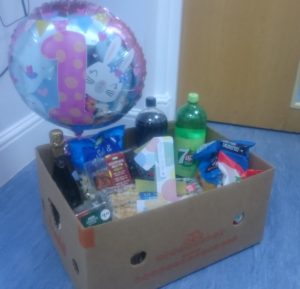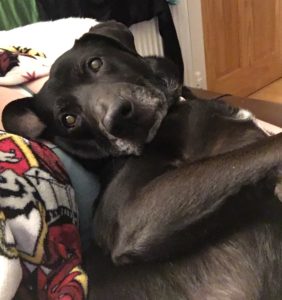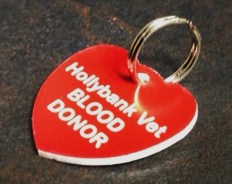Some of you may remember Stinky the cat who had chemotherapy for lymphoma. He responded very well to his treatment and it is now a year since he finished his chemotherapy! To mark the occasion his lovely owner brought us in a basket of goodies to celebrate such a fantastic milestone. Well done Stinky!
cat who had chemotherapy for lymphoma. He responded very well to his treatment and it is now a year since he finished his chemotherapy! To mark the occasion his lovely owner brought us in a basket of goodies to celebrate such a fantastic milestone. Well done Stinky!
March is……Pet Anxiety Awareness Month
This month is pet anxiety month and we wanted to take the opportunity to talk about sound sensitivity. This is common problem in dogs and is most noticeably seen around bonfire night and New Year’s Eve when fireworks are used. There are advantages of starting a behavioural modification program at this time of year (when hopefully our pets are less likely to hear any bangs) as a tool to overcoming sound anxiety. Natalie, one of our nurses, explains more:
Sound (firework) sensitivities: An ideal disease?
If you have a sound reactive dog you will probably be shouting at the title of this article. I myself have a sound reactive dog and there is nothing ideal about it! It can ruin a lovely walk if she hears a gunshot in the distance and it can end time out in the garden if she hears any bangs.
So why is it an ideal disease?
- It is detectable in its earliest stages without expensive tests
- In most cases owners have already identified the problem
- It is possible to predict how and when it might start and develop
- It is common and seasonal
- It can be treated at almost any time of year
- It is easily preventable from getting worse
- Effective treatment and prevention strategies exist
- It is possible to plan ahead and help before the problem becomes really serious
- It is treatable without drugs in its early stages
Fear is a normal emotion which helps to protect us from harm. This becomes a problem when the perceived threat is in fact perfectly harmless. There are two stages to firework related fear. Stage one dogs may not be seen in by us as they are successfully using coping strategies at home e.g. avoidance – by using hides that you may not be aware of. It is important to try and recognise this stage and start a desensitisation program. Stage one dogs often respond well to a treatment plan.
If a treatment is not implemented they are at high risk of developing stage two signs. Factors that influence progression to stage two can be very simple and unfortunately are unavoidable – for instance unexpected exposure to the noise and a failure to use their coping strategy. Changes may occur that feel insignificant to us but mean a lot to our dogs e.g. altering access to hideouts when we may have been unaware of their use.
Pets suffering from stage two anxiety can have added complications. Excessive sound sensitivities can develop and generalisations can occur. The sensitivities can become linked to other sounds such as car doors closing, fires crackling, air breaks, microwave pings and fire alarm, to name but a few. They can also learn ‘predictable cues’ as to when an event might happen, for example when it becomes dark or when the owner leaves home. They can also make associations with where they have experienced the event before and so they then refuse to go to certain places or they become destructive in a certain room due to association with the sound.
Treatment plan
There are 3 factors in relation to treatment of firework phobias.
- Behavioural modification
- Pheromone therapy
- Medical intervention
Behavioural modification involves the use of desensitisation and counter-conditioning which are used to help change the emotional reaction to the stimulus (fireworks). This should be started at a time of year where there is less chance of an unexpected event taking place e.g. March or April, giving several months for the behavioural modification to take place. Desensitisation helps to reduce the reaction to the stimulus. CD tracks are available along with a handout, free of charge, from the Dog’s Trust website. The handout explains the process and helps you to train your dog to be less reactive to the sounds. This must be done in a stress free environment to reduce the potential of triggering a response. At the end of desensitisation your dog should have very little reaction to the sounds but there is a real risk that this training can be undone if counter-conditioning is not performed. Counter-conditioning is the association of the sounds with a positive emotion. To achieve this positive emotional state, play or food is used when the sound starts and stops when it finishes. This makes the sound a predictive cue of something good happening e.g. when the treat cupboard door opens.
In certain cases where dogs are particularly anxious and have generalised their fear to many different sounds, the use of medication may be useful to help with their anxiety whilst they are going through the behavioural modification program. By reducing their anxiety your dog will be able to learn quicker. Pheromone therapy can also be useful as it helps to maintain a stress free environment.
If you would like any further information or you would like to speak to a member of staff regarding sound sensitivities and starting a treatment plan please contact the surgery.
Give away time!
The first 10 people to email a photo of their dog to helen@hollybankvets.co.uk will receive a Sounds Scary CD and the chance to go into a prize draw to win an Adaptil diffuser.
Blood Donors Needed!
As with humans, dogs sometimes require blood transfusions. We have a National Pet Blood Bank which can provide us with lots of different blood products but sometimes a transfusion directly from a donor is most appropriate for our patients. Donor lists are dogs that meet certain criteria that we know we can call on if we require an emergency transfusion. They can provide us with products that the Pet Blood Bank cannot –such as platelets that are essential to help the blood clot. The added benefit to our patients of having donor blood is that it is available immediately, without having to wait for it to be delivered from the blood bank. from the blood bank.
Donor dogs need to have a relaxed, friendly temperament and be happy to sit still for a period of time. We only ask dogs who are over 25kg in weight and between one and eight years old. Donor dogs must never have travelled and must not be on any medication. We also require them to be vaccinated up to date. We perform a thorough clinical exam and run a full blood screen on all dogs prior to them donating to ensure that they are in good health.
We clip fur from the neck and place a needle into the jugular vein to collect the blood. Most dogs happily lie comfortably on their side whilst this is being done. We collect blood into a bag that is lined with a special substance to stop it clotting. The whole procedure only takes about ten minutes and afterwards the dogs receive the equivalent of our tea and biscuits – a bowl of water and some food! As well as a big fuss too!
Dog blood donors really do save lives and we are incredibly grateful to our donors and their owners.

By the very nature of blood donation we often need to call on our donors at short notice. We understand you may not always be available to bring them down but if you would be happy to be placed on our donation list we would be very appreciative.
If you think your dog might be a suitable donor, would like to discuss it further or would like to be placed on our list then please email Helen at the surgery on helen@hollybankvets.co.uk.
